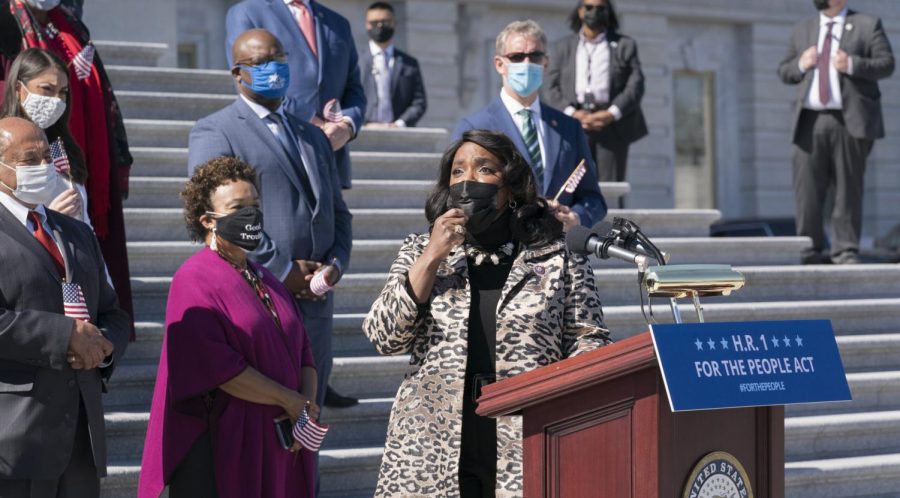Politics Weekly 3 – H.R. 1 sets up a critical moment in Washington
More stories from Aiden Rood
Rep. Terri Sewell, D-Ala., speaks at the Capitol to answer questions on the For the People Act.
This week in the U.S. House of Representatives, a critical debate is ongoing over a piece of legislation called H.R. 1, also known as the For the People Act. This bill would, if passed, make a number of major reforms to make it easier for Americans to exercise their right to vote. It is critical that this legislation is passed by the House and Senate and signed by President Biden. Looking beyond the bill itself, whether it becomes law will be an important representation of where our politics stand today.
The For the People Act combines a number of long-needed reforms to our voting system into one great package. It creates automatic voter registration, preventing “I forgot to register” from ever again being the reason a voter is disenfranchised. It stops voter rolls from being “purged” in a deeply problematic process in which voters are removed from the list of registered voters due to reasons such as the state thinking someone has moved. Often this practice serves to disenfranchise people who are removed for no good reason. The bill also transforms the redistricting process to eliminate “gerrymandering,” in which partisan lawmakers draw election districts to benefit their party’s chances to win. Other measures include expanding early voting, improving election security, and reducing the influence of big money in politics. For all of these reasons, the bill should absolutely be passed and become law.
Unfortunately, the legislation faces a tough path forward to become law. That should seem surprising, as Democrats, who almost all support expanding voting accessibility (shouldn’t everyone? – but more on that shortly), control the House, Senate, and Presidency. Indeed, the bill is expected to pass in the House soon. President Biden has committed to sign it into law as well! The big problem, however, lies in the Senate. While the Democratic majority there supports the bill, majorities don’t always rule in that chamber of Congress. The filibuster, an archaic procedural tool, makes it such that 60, not just 50, of 100 Senators support legislation for it to be able to pass. The Democrats only have 50 votes and it’s very unlikely that 10 Republicans would join them in support of H.R. 1. While the simple solution would be to get rid of the filibuster, an action that can be taken with just 50 votes, some Democrats are refusing to do so. Thus, if nothing changes, the For the People Act will die in the Senate.
The reality of H.R. 1 is a reality that represents where the political process stands in Washington today. For one, the fact that Republicans refuse to support widely popular measures to expand voting accessibility shows how far the party has gone from being one that genuinely cares about the well-being of Americans. It should be obvious that more people voting is a good thing, but Republicans lose more often when more people vote, so they won’t support this legislation. That’s deeply wrong. What’s even worse, though, is the reality of antiquated procedural gridlock that may truly be the death of this legislation. If Democrats refuse to end this form of minority rule and move forward in passing this bill, they will not be able to accomplish any of their other legislative priorities, either. The current situation in Washington is one in which leaders have a choice. They can choose to do what’s right and make progress, or they can choose to maintain the proud Washington tradition of getting nothing done. H.R. 1 is a key bill for the future of our democracy in its own right, but its impact will be even greater than the reforms within it. H.R. 1 will force Democrats to make that choice between progress and stagnation with the backdrop of taking important, popular action on voting accessibility. They must choose progress, or else our governmental process will be headed even further down a very dark road.

